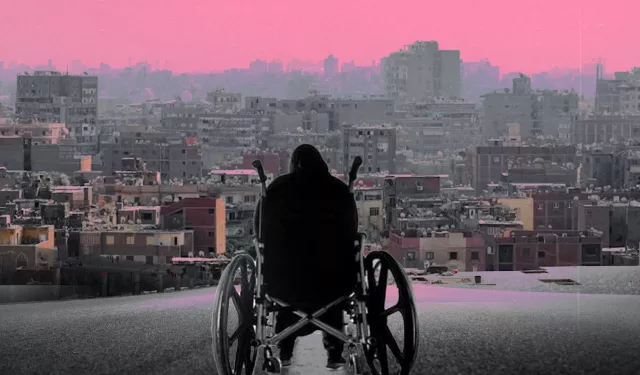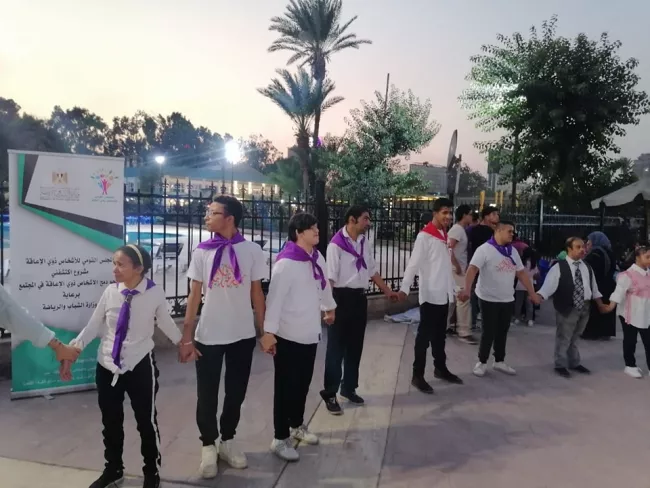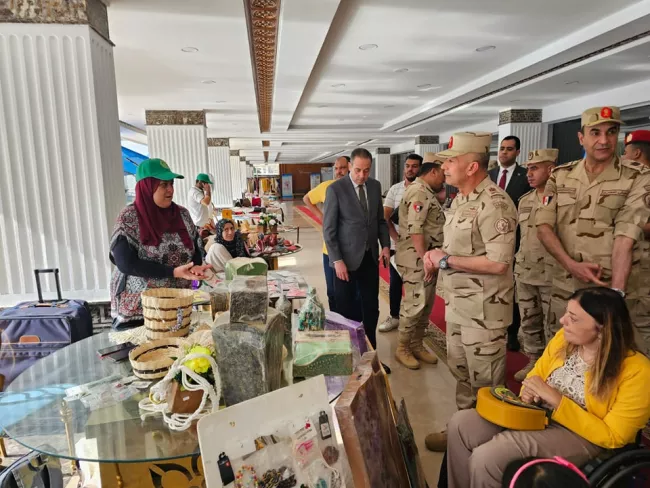
On crutches and in circles: Mohamed's year-long struggle for a disability card in Egypt
On the morning of Nov. 5, 2023, Mohamed Magdy woke up in his home in the Al-Haram neighborhood of Giza Governorate, determined to submit a renewal request for his Integrated Services Card for persons with disabilities via the Ministry of Social Solidarity’s online platform.
This was a preparatory step towards applying for a job at a private industrial company, which was set to open its doors to applicants with disabilities at the start of 2024, as part of the employment quota allocated to persons with disabilities in Egypt.
The Ministry of Manpower requires private-sector companies with 20 or more employees to ensure that at least 5% of their workforce consists of individuals with disabilities, in accordance with Article 22 of Law No. 10 of 2018.
Mohamed, 35, set out to get an early start on his paperwork. He had two full months before the job opportunity he had been dreaming of would open its application window. This seemed like ample time to renew his Integrated Services Card, whose five-year validity had expired earlier in 2023. He assumed the process would take no more than three days. However, it would become an arduous journey that would stretch over an entire year.
The beginning of the journey
For an a whole month, Mohamed, who relies on a crutch for mobility, logged onto the online platform daily, anxiously awaiting the scheduling of his medical examination.
As the days dragged on, his hope turned to despair. “Was my application rejected? Did I make a mistake during the submission process? Is the website functioning properly, or is it down?” These questions swirled in his mind.
The Integrated Services Card offers a range of benefits and services, including educational inclusion in schools and universities, job placements under the 5% disability employment quota, a 50% income tax exemption, and exemptions from customs and taxes on vehicles and equipment imported for use by persons with disabilities, Mohamed El Okaby assistant minister of social solidarity for strategic communication and the ministry’s official spokesperson, explained to Al Manassa.
The Ministry of Social Solidarity issues the card in collaboration with the Ministry of Health, based on certified medical and functional assessments. The card’s data serves as official proof of a disability, detailing its type and degree, in dealings with all authorities, including legal and investigative bodies.
Paid examination
Mohamed shared his growing concerns about his application, which seemed to have vanished into a black hole, with a friend. “He told me that it would take at least two more months before they even acknowledged my request and fixed an appointment. ‘Don’t worry,’ he said. ‘Your application wasn’t rejected, and the website is working fine. That’s just how they operate—it takes them three to four months to respond,’” Mohamed recalled to Al Manassa.
Despite the discouraging news, Mohamed refused to give up. Determined to salvage the job opportunity, he repeatedly negotiated with the company.
Eventually, he convinced them to grant him a new, exceptional deadline, allowing him to submit his application with a copy of his expired card and a written commitment to provide the new card by February at the latest. This small success filled him with renewed happiness and energy.
But his relief was short-lived. February came and went, shrouded in gloom as Mohamed faced the looming reality of losing the job. Three months had passed since he had submitted his application, yet no response had arrived.
Finally, in early March, the outcome appeared on the website: Mohamed was assigned a date for the medical assessment. Now he had to take tests at a public hospital, after which he would receive a detailed report, stamped with the official seal, specifying the type and degree of his disability.
“The next morning, I went to the nearest hospital in Al-Haram to get the report done. They asked me to pay 950 Egyptian pounds ($19) for the report and the X-rays,” Mohamed said. “That was my second shock. We’re supposed to have free examinations on regular days—so why am I being charged almost a thousand pounds just for a report?”
Mohamed El Okaby clarified that “medical examinations in public hospitals are free for holders of the Integrated Services Card.” However, because Mohamed’s card had expired, the hospital treated him—and others with expired cards—as though they were not persons with disabilities!
The military knows best
After paying the hospital fees and obtaining his report, Mohamed prepared his documents for the medical assessment. Yet another obstacle emerged. “The result said I had to go to a military hospital in the 6 of October area. Why are they sending us to military hospitals? We’re not war casualties,” Mohamed lamented.
Anxious but determined, Mohamed arrived at the military hospital, carrying his X-rays and the stamped report from the public hospital. He spent hours waiting alongside a long list of other individuals referred to the same hospital. When the staff finally called his name, he rushed over—only to be asked to pay an additional 250 pounds for the physical disability assessment.
“I couldn’t hide my frustration. When I reached the cashier, he told me, ‘You should be thankful. It’s 650 pounds for other types of disabilities.’ I paid in silence and went back to wait for my turn, bracing myself for the fourth shock,” Mohamed said.
When he entered the medical committee’s office at the military hospital, hoping to finally conclude his exhausting day, he handed over his documents. To his dismay, the committee rejected the public hospital report and demanded that he redo the assessment and X-rays at that same military hospital.
Struggling to contain his frustration, Mohamed mustered the courage to ask, “With all due respect, the report I have is exactly what you asked for—from a public hospital—and it confirms my mobility impairment.” The doctor replied curtly, “Regulations and procedures stipulate that we only accept reports from military hospitals.”
Mohamed’s mind raced with questions: “Why was I asked to get a report from a public hospital if it wouldn’t be accepted? Why did I waste 1,000 pounds for nothing? Why are we being dragged between hospitals?” His fear kept him from voicing these thoughts aloud, he told Al Manassa.
Summoning his last bit of strength, Mohamed asked the staff member what to do. The response delivered the fifth blow.
“Come back in a month for the approved medical examination,” he was told.
At this point, Mohamed could no longer hold back his frustration, muttering under his breath, “God is my witness. You’ve wasted the job and five months of my life for nothing.”
A source within the Rehabilitation Administration at the Ministry of Social Solidarity told Al Manassa that it is not uncommon for some citizens’ applications for the Integrated Services Card to be redirected to military hospitals.
The source, who requested anonymity, explained that this is done to “avoid potential violations that sometimes occur in public hospitals.”
“Some individuals obtain medical reports from public hospitals without undergoing any real examinations, often in exchange for money. Referring certain applicants to military hospitals, especially those with conditions that could change over time—like hearing impairments—helps prevent such abuses,” the source elaborated.
For permanent disabilities that do not change over time, reports from nearby public hospitals are usually accepted, the source added. “There is currently a proposal under review to eliminate this requirement altogether for permanent disabilities."
Back to square one
In April 2024, Mohamed arrived at the military hospital for his scheduled appointment.
At the cashier’s desk, he was asked to pay 650 pounds for X-rays and an official report. After completing the X-rays and receiving a report identical to the one he had obtained previously, he approached the staff member to enter the medical committee again—only to face the sixth shock.
The employee refused to sign the report that day, saying, “You’ll need to submit an application for completing the documents on the website and wait for a new appointment, just like you did before.”
“I’ll be back at square one! How could a whole year of my life be wasted like this for nothing?” Mohamed couldn’t contain his frustration. He left without waiting for any further response, knowing the employee wouldn’t be able to help him.
The next morning, Mohamed rushed to his computer to submit a new application for an appointment. Two weeks later, he received a new date—two months away—at the same military hospital.
In mid-June, Mohamed returned to the hospital for his appointment. “There were many people from distant governorates like Fayoum, Beni Suef, and Ismailia,” he recalled. This time, however, his frustration was mingled with sorrow as he observed others enduring the same plight.
The source from the Ministry of Social Solidarity told Al Manassa that the number of beneficiaries of the Integrated Services Card, after records were cleaned up, had exceeded 1.15 million people. In September, Marguerite Sarofim, Deputy Minister of Social Solidarity, revealed that 1.3 million cards had been issued, meaning around 150,000 beneficiaries were removed during the filtering process.
Another exhausting day ended for Mohamed. After his examination, the staff member simply told him, “Check the status of your request on the rehabilitation office’s site in a month.” Mohamed returned home, burdened by fatigue from yet another long day and the additional costs he had incurred.
As he thought back to the citizens he had met throughout the day, particularly those who had traveled from distant governorates, Mohamed couldn’t help but wonder how they would manage the hardships of returning home.
A never-ending cycle
In August, after another month of waiting, Mohamed received a message that read, “Your request has been referred to the Ministry of Social Solidarity.” The cryptic nature of the message left him puzzled, prompting him to begin yet another phase of inquiries to decipher its meaning.
Eventually, he learned that it meant he needed to visit the nearest rehabilitation office affiliated with the Ministry of Social Solidarity.
He went to the rehabilitation office in Boulaq El-Dakrour, the closest one to his home. “They asked me to pay 55 pounds at a Fawry machine to upload the file to the ministry and then wait two months. I was also told to check the website regularly for the message: ‘Your card is ready for collection,’” he explained.
As expected, another month passed with no progress.
Mohamed waited three more months until November, when the long-awaited message finally appeared. Hopeful that the ordeal was nearing its end, he went to the Social Affairs Office in Manshiyet El-Bakari, Faisal, to collect his card. But instead of relief, he encountered his eighth shock.
“The first thing I asked was whether my card had been printed,” Mohamed recounted. “They said yes, but I had to pay 105 pounds at Nasser Bank first. It’s like we’re treated as a mobile bank or punished like prisoners. There’s no consideration for our condition!”
With no other option, he traveled to the Nasser Social Bank branch, which was close to his home but far from the Social Affairs Office. He then had to return to the office on the same day with the receipt in hand.
Finally, after a grueling year filled with repeated setbacks, Mohamed was able to collect his Integrated Services Card. But his joy was short-lived.
He discovered the ninth and final shock.“When I saw the card’s validity, it was only for three years!”
This directly contradicted statements from the Minister of Social Solidarity’s advisor, who had assured Al Manassa that the card was valid for five years unless the holder’s disability status changed.
A new mechanism
El Okaby, assistant Minister of Social Solidarity, believes Mohamed Magdy’s arduous journey may soon be a thing of the past.
The ministry has developed an automated system, in collaboration with the eFinance company, in the form of a mobile app to track the status of requests from persons with disabilities. This new system will allow all those signed up to monitor the real-time status of issued and delivered cards, the official explained.
The ministry has completed the development of the app and trained the central team and workers in five governorates. Further training will be rolled out progressively in additional governorates, according to El Okaby.
The app will enable citizens to regularly monitor the status of their requests, allowing for the registration and uploading of data, with approval or rejection from the office manager on the same day the request is made. The relevant directorate and the General Administration at the ministry’s headquarters are expected to respond within three days of submission.
Mohamed’s experience sharply contrasts with the government’s stated efforts to improve services for persons with disabilities, despite the ambitious initiatives launched following President Abdel Fattah El-Sisi’s declaration of 2018 as the Year of Persons with Disabilities in Egypt.
“The first time I received it, it was delivered to my home address by mail, without me having to make a single trip or pay any fees!” he says, sensing the same contradiction between the officials’ statements and his own experience in renewing his card.
Mohamed Magdy’s year-long journey is not unique. Many of his fellow citizens with disabilities have faced similar struggles. The types of shocks they encounter may differ, but all end with the same result: a clear reluctance to issue the cards.
A version of this article first appeared in Arabic on Dec. 4, 2024



